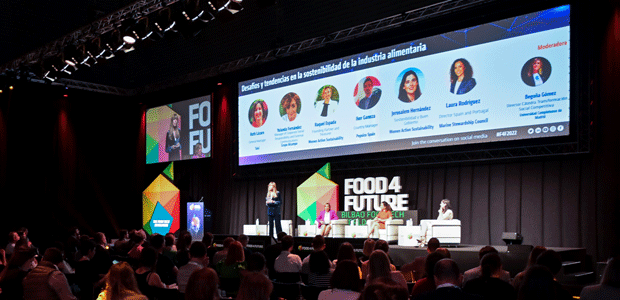
New business models based on circularity and industry 4. 0 mark the future of the agri-food sector
Organisations such as Invisible Foods, The DOEN Foundation, Alcampo, or Innosapiens, among many others, analyse how technology and innovation can make an industry more sustainable. Food waste is set as one of the main challenges tobe faced through digitalisation, cooperation between companies and exploitation strategies.
Food and beverage waste is behind some of the food industry's biggest problems related to sustainability, as highlighted at Food 4 Future- Expo FoodTech 2022. To fight against the waste of the agri-food sector, the technologies of industry 4.0 have become a great opportunity with which emerging and consolidated companies are working with the purpose of promoting a circular consumption system and opening new business opportunities.
In this sense, the startup Invisible Foods, which promotes the reduction of food waste through Big Data and IoT, and The DOEN Foundation, a foundation that supports initiatives in the field of the green and inclusive economy, have analysed examples where food waste has become a business opportunity. Dynamic pricing policies in retail, the creation of specific marketplaces for products that pass the recommended consumption date, or the development of new products and ingredients from food waste are some of the strategies that have been explained.
Mirjam Niessen, Impact investment manager of The DOEN Foundation, has underlined the need to undertake changes from the bottom of the food system: "We cannot talk about technology to farmers who cannot afford it. We must improve prices for farmers and value the products that we have hitherto rejected. Once this is possible, we will be able to improve the cultivation system, with less intrusive and more sustainable techniques. And finally, they will be able to generate the data that allows them to make the entire value chain more efficient."
Food waste is a challenge that also requires cooperation between actors and initiatives. Neville Mchina, CEO of Invisible Foods said: "All the initiatives currently being carried out are good initiatives, but somehow they are disconnected from each other. We have activity silos in which we face the same problem from different aspects. If we combine and connect all these activities, we will have a vision and a global solution to the problem."
Large corporations, such as Alcampo, have already advanced in projects to reduce food waste and currently, only 12% of the waste in the chain goes to landfill, according to data from the company itself. "We are working on circularity through alliances with different actors, large and small, which have already become new products available in the market," says Yolanda Fernández, Manager of Corporate Social Responsibility and External Communications at Alcampo.
Cooperation, technology, and innovation: the 3 keys to transforming the food industry
The experts who are meeting in Bilbao these days within the framework of Food 4 Future 2022, point to technology, innovation, and collaboration between different social and economic actors as the levers of change that must pivot the transformation of the food system towards a more competitive and sustainable ones.
Graham Cross, the founder of Innosapiens, has emphasised cooperation as a driving force for innovation to respond to the challenges facing the industry: "It is very difficult to build organisations that have everything. It is easier to find small ideas in various organisations that complement each other and grow together," he said during his speech.
According to the study presented in F4F2022 "The sustainable transformation of the agri-food sector" by Women Action Sustainability (WAS) and KPMG, food companies confirm that they are relatively well prepared for sustainability, but need to generate more alliances and capacities that drive transformation and innovation in the sector.
Among the challenges that the industry itself sees in its transformation, the study points out that "they have to do with climate change, circularity, innovation, technology and making solutions competitive", has introduced Jerusalem Hernández, Partner - Sustainability and Corporate Governance of KPMG. Likewise, the sector has also identified as one of the main brakes forthe evolution of the sector the financing and support to SMEs. At this point, "technology, innovation, collaboration between different entities are the keys" concluded Hernández.

